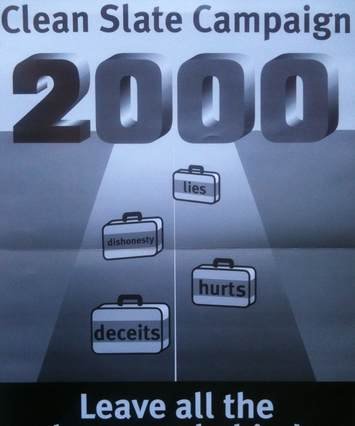Talk given by Indarjit Singh OBE JP, Director, Network of Sikh Organisations, UK, linking to the Clean Slate Campaign of which he was a patron.
As the turn of the century draws near, more and more people seem to be looking to smaller projects that recognise the importance of the individual in effecting change as a way of celebrating the new millennium. One of the best that I've come across is a project called the Clean Slate Campaign. The idea is simple. Think of someone or some group that you have wronged and offer reconciliation. Wipe the slate clean on a bruised relationship. It's the brainchild of Edward Peters from Oxford. The idea came to him after he fell out with a valued friend over a foolish and cutting remark he had made. Eventually years later he apologised and a valued friendship was restored. It's a simple idea we can all easily carry into our daily lives. My problem would be where to start — I'd be spoiled for choice!
The idea of forgiveness and the seeking of forgiveness is central to many of our religious traditions. The Christian Lord's Prayer reminds us to forgive those that trespass against us. Our Sikh Ardas, or daily prayer, applauds those who forgive the faults of others. And in another verse in our holy scriptures, Guru Nanak reminds us to "never let the night fall on our anger". Or, in the metaphor of the Clean Slate Campaign, to wipe the slate clean each night.
The question of apologies and forgiveness comes up regularly in international relationships. A couple of years ago while the Queen was on a state visit to India, some vocal groups were asking for a public apology for the Jallianwala Bagh massacre of several hundred people in Amritsar in 1919. Last weekend during the Pope's visit to India there were demands for an apology for the treatment of people in Goa by Portuguese Christians 400 years ago. And the same sort of apologies are routinely demanded for undoubted wrongs in other parts of the world.
As we enter a new millennium, perhaps it's time to wipe the slate clean on wrongs done by generations long ago to generations long gone. And look instead to the wrongs that we as individuals and wider groups are currently inflicting on those both close to us and those further afield. The Gurus reminded us of the need to seek the forgiveness of those we wrong while at the same time working for a kinder and fairer society — a tall enough task which can only be damaged if we continue to be obsessed with the wrongs of past centuries.


